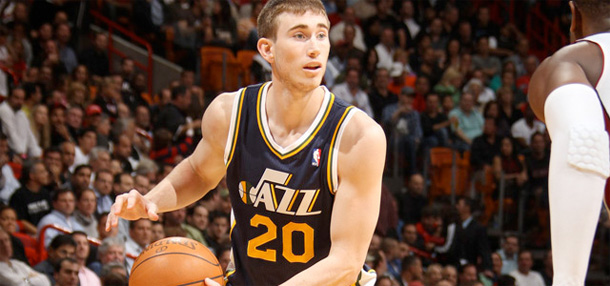The Jazz are still undergoing some reconstruction.
Anchored by a veteran front line and energized by improving younger players, the Jazz are fighting through a season standing at 24-21. That total puts them at 4th in the Northwest division.
They score just under 99 points per contest. An impressive stat, were it not matched by the 98 points the Jazz give up per game. Utah’s starting point guard, Mo Williams, is out with an injury and a suddenly extended time table. They have also accrued the 3rd most turnovers in the NBA.
Fortunately, it’s not all bad news.
The Jazz have in fact played considerably good basketball. Before his injury, Mo Williams was having a solid season (his averages stand at 12.9 ppg and 6.7 apg). 2nd year guard Gordon Hayward is starting to find his way, averaging 13.5 ppg, 3 rpg, and 2.3 apg.
What has really been quite impressive is the team’s rebounding.
Utah’s total rebounding numbers are not quite elite. With a count of 1740, the Jazz have snagged the league’s 14th most rebounds.
Though their rebounding figure is middle of the pack, consider this: The Jazz have a defensive rebounding percentage of just over 72%, good for 21st in the league.
There’s a fairly simple explanation for the lack of defensive rebounds: Opposing teams are scoring the heck out of the ball against Utah. The Jazz give up 107 ppg, putting them in the bottom rungs in terms of defensive rating. Though the Jazz do cause turnovers at a 14% rate (10th in the league), they also cough the ball up at 14% (15th), effectively cancelling out any advantage.
Regardless, Utah’s total rebounding number contrasts with their inefficiency on the defensive glass. So, there’s pretty much just one explanation: The Jazz are feasting on offensive rebounds.
As things stand, the team has amassed 519 offensive rebounds, good for 5th best in the NBA. Their front line is a huge key to their prowess on the offensive glass. Utah boasts a potent front court consisting of veterans Al Jefferson and Paul Millsap. Assisting in the efforts are two hard-nosed youngbloods in Derrick Favors and Enes kanter.
Jefferson and Millsap combine for an average of 4.5 offensive rebounds per game (2 for Big Al, 2.5 for Millsap). Derrick Favors brings down 2.4 per game. In just 14.9 minutes of floor time per contest, Kanter has managed to grab half of his 4.2 boards per game on the offensive end.
In fact, Utah’s appetite for offensive rebounding extends beyond their premiere big men. DeMarre Carroll collects 1.5 of his 3.4 rebounds per game on offense. Gordon Heyward and Marvin Williams also contribute just under one offensive board per contest.
Again, Utah’s defense has consistently put them at a disadvantage this year. Fortunately, their success grabbing rebounds on offense has been more than just a bragging right. One may safely assume it has contributed heavily to the Jazz having attempted the NBA’s 8th most free throws.
Great Offensive Rebounding = Not-So-Great Offense?
Those rebounding numbers are the result of more than just hustle. They might even be an intentional side effect on the part of a particular Corbin strategy.
The Jazz do not shoot a ton of three’s. Heck, with 716, they’re 24th in the league in attempts from deep. With that being said, they’ve hit their three’s at a 37% rate. That puts them at 8th best.
A three pointer is arguably the toughest shot to rebound as an offensive player. It takes more time to get to the rim (being that it’s farther away). To add on, some guys just seem to shoot with a different form from deep, making it hard to predict the ball’s final trajectory. In that light, Utah’s aversion seems valid.
Unfortunately, that validation quickly fades when you consider the team’s struggle generating wins with their offense.
Though it has definitely helped them reach elite status as a rebounding team (on the coattails of offensive rebounding, no less), one has to wonder if the Jazz would be better served to just let it fly.
They certainly wouldn’t be the first team to win on three’s and poor defense.
Mohamed Abdihakim is a journalism student at Florida Atlantic University. He is a Phoenix Suns fan, who is not prepared for the possibility of Nash winning a title in a Lakers jersey. Mohamed is also an editor at Hoops Nation and contributes to Les Snobs. Interests include International basketball, Mad Men, and blues music. Nearly all stats are credited to Hoopdata or Basketball-Reference.
Twitter handle: @Abdi_hakim.


















